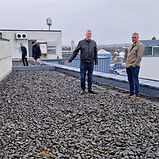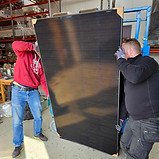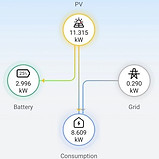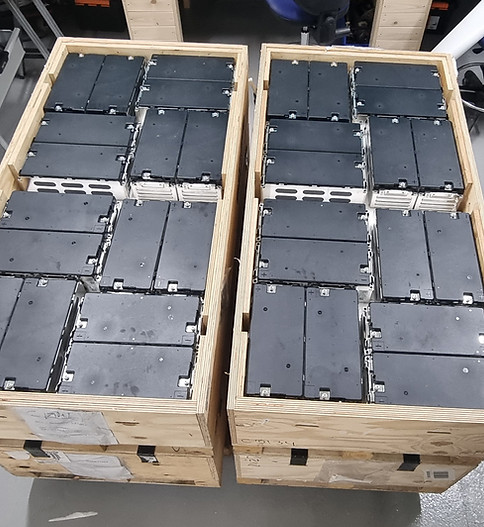
Orkulausnir fyrir sjálfbæra framtíð

Með nýsköpun og þekktum tæknilausnum hjálpum við viðskiptavinum að lækka raforkukostnað og bæta orkunýtni.
Sérhæfing í framleiðslu sólarorku með vönduðum sólarsellum


Ávinningur sólarorkulausna
-
Lækka kostnað vegna rafmagns og flutnings sem fer stöðugt hækkandi.
-
Auka fyrirsjáanleika í rafmagnsverði.
-
Verða sjálfbærari um framleiðslu á eigin rafmagni.
-
Auka orkuöryggi í rafmagnstruflunum og skerðingum.
-
Jafna afltoppa og þannig draga úr kostnaði.
-
Bregðast við orkuskorti með því að minnka álag á kerfið.
-
Draga úr notkun olíu til rafmagnsframleiðslu.
-
Liður í sjálfbærnimarkmiðum á sýnilegan hátt og hafa jákvæð áhrif á ímynd.
-
Draga úr kostnaði við kaup á upprunábyrgðum.
Þjónusta Alor
.jpg)
Forgreining
Áður en kerfi er sett upp greinum við orkunotkun, metum hagkvæmni sólarorkukerfis og áætlum sólarorkuframleiðslu eftir nákvæmri staðsetningu.

Hönnun og búnaður
Við hönnum verkefnin eftir þínum þörfum, veljum tæknibúnað sem hentar og flytjum hann til landsins frá birgjum Alor.

Leyfismál og styrkir
Sérfræðingar okkar sækja um leyfi og senda tilkynningar til viðeigandi aðila auk þess að annast samskipti við hagaðila. Við höfum kortlagt fjárhagslegan stuðning og ívilnanir og aðstoðum við umsóknarferli.


Uppsetning
og viðhald
Eftirlit
Sérþjálfaðir samstarfsaðilar Alor annast uppsetningar og tengingar sólarorkubúnaðar auk viðhalds og þjónustu eftir uppsetningu.
Alor annast eftirlit með kerfum í gegnum sérhæfðan hugbúnað sem sýnir stöðu kerfis og samspil við raforkukerfið sem búnaðurinn er tengdur við. Viðskiptavinir fá aðgang að hugbúnaðinum.
Sólarorkuverkefnin okkar

Geymsla sólarorku
Sólarorka er breytileg, þar sem hún er háð birtuskilyrðum sem eru mismunandi eftir tíma dags og veðurskilyrðum. Víðsvegar um heiminn er algengt að nýta saman sólarsellur og rafhlöður. Þannig er hægt að safna umfram rafmagni inn á rafhlöðuna og nýta þegar þörf er á, t.d. þegar framleiðsla sólarsella er lítil eða engin og einnig þegar rafmagnstruflanir verða í kerfinu.
Rafhlöður þjóna einnig mikilvægu hlutverki þegar kemur að geymslu sólarorku á svæðum utan raforkukerfis.
Teymi og samstarfsaðilar
Teymi okkar og samstarfsaðilar er fjölbreyttur hópur sérfræðinga sem samanstendur m.a. af verkfræðingum, byggingfræðingum, húsasmiðum, löggiltum rafvirkjum sem og sérfræðingum á sviði sjálfbærni og regluverki sem gildir um endurnýjanlegar orkulausnir hér á landi.

Linda Fanney Valgeirsdóttir
Framkvæmdastýra

Rakel Eva Sævarsdóttir
Viðskiptaþróun og sjálfbærnisérfræðingur

Dr. Rúnar Unnþórsson
Tæknistjóri Alor og prófessor við Iðnaðarverkfræði, vélaverkfræði og tölvunarfræðideild Háskóla Íslands.

Máni Frímann Jökulsson
Byggingafræðingur (verktaki)

Valgeir Þorvaldsson
Húsasmiður og frumkvöðull

Connor O'Neill
Sérfræðingur í orkunýtni, rafhlöðum og orkulausnum.

Solar Danmark A/S
Alor hefur undirritað samninga um einkarétt á sölu orkulausna hins öfluga danska dreifingaraðila Solar Danmark A/S á Íslandi. Um er að ræða rótgróið fyrirtæki í Danmörku sem er ríflega 100 ára gamalt og sérhæfir sig í endurnýjanlegum orkulausnum með sérstaka áherslu á sólarsellur. Sérfræðingar Solar styðja við hönnun og uppsetningu verkefna Alor hér á landi og byggja á áralangri sérþekkingu.

VHE Stálsmiðja ehf.
VHE í Hafnarfirði aðstoðar við hönnun og smíði sérútbúinna festinga fyrir íslenskar aðstæður enda nauðsynlegt að orkulausnir sem innleiddar eru hér á landi standist ágang íslensks veðurfars. Sérfræðingar VHE búa yfir víðtækri þekkingu á þessu sviði auk þess að annast mat á burðarþoli í verkefnum í samstarfi við Alor, ef þörf er á.

Tengill ehf.
Tengill annast tengingar á orkulausnum fyrir Alor en hjá félaginu starfa tugir löggiltra rafvirkja um land allt, sem hafa víðtæka reynslu á sviði rafverktöku.


Notaðar rafbílarafhlöður fá framhaldslíf
Alor vinnur að þróunarverkefni í samstarfi við Háskóla Íslands sem snýr að því að gefa notuðum rafbílarafhlöðum framhaldslíf um allt að 10 ár. Í verkefninu eru útbúnar kyrrstæðar rafhlöður eða Battery Energy Storage Systems (BESS lausnir). Lausnirnar m.a. nýttar sem blendingslausnir samhliða dísel rafstöðvum, sem geymsla rafmagns sem framleitt er með óstöðugum orkugjöfum eins og sól og vindi til þess að stuðla að jafnara orkuflæði og til þess að jafna afltoppa í raforkukerfinu.
Frumgerðir hafa þegar verið útbúnar og pilot samstörf hafin.
Styrkir








Verðlaun






